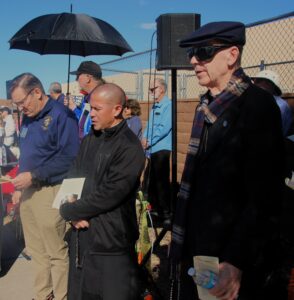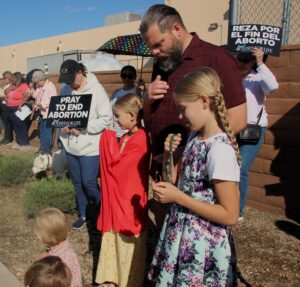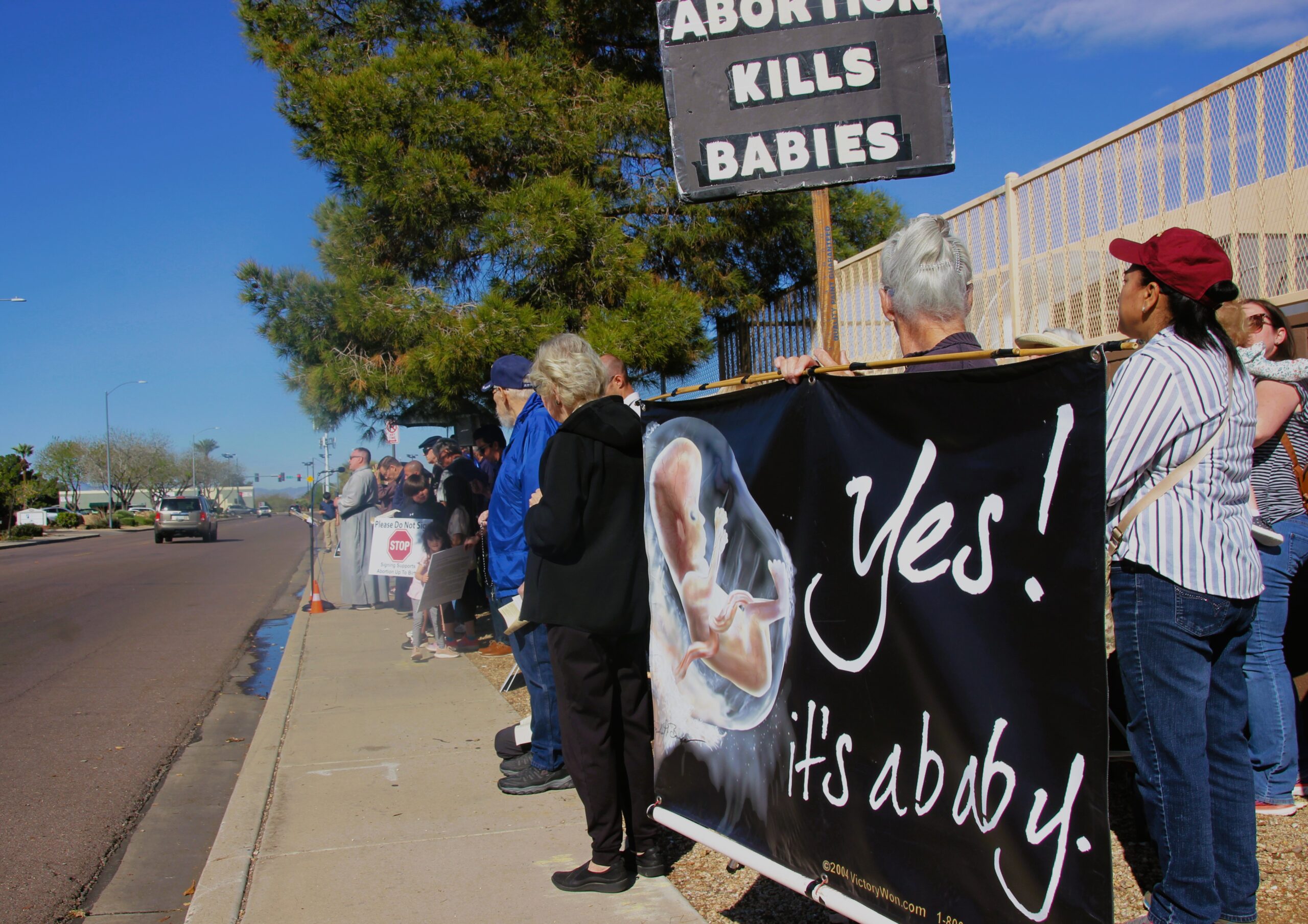GLENDALE, Ariz. — An estimated 100 people, led by Bishop emeritus Thomas J. Olmsted, prayed the Rosary for Life outside Planned Parenthood in Glendale Saturday to end abortion and prevent Arizonans from approving a state constitutional amendment permanently legalizing the practice throughout pregnancy.

The Rosary was the fifth of seven such events across the Diocese during Lent 2024, capped by the annual Good Friday Rosary for Life also slated to take place outside the Eugie Avenue abortion clinic.
“We need to be here. The primary way we change people’s minds and hearts on this issue is prayer,” Bishop Olmsted said before the rosary. “Jesus said, ‘Ask and you will receive. Seek and you will find.’ We trust in that, and we believe prayers are the key way to bring abortion to an end,”
The rosaries come at a time of penitence and preparation. Throughout Lent, Catholics pray, fast and give alms, practices intended to deepen one’s connection with God and their awareness of Jesus’ sacrificial love.
VARIETY OF STATE LAWS
The Rosary for Life, or the Life Rosary, is similar to other rosaries with some distinct characteristics.
Its colored beads represent intentions offered, such as red for the spilled blood of Jesus and babies killed inside clinics; black for society’s culture of death; blue for strong pro-life laws; and green for those working for life.
Participants prayed 15 decades across the Joyful, Sorrowful and Glorious mysteries.
“Let our presence here give mothers the strength to choose God and choose life,” were the distributed printed prayers, recalling Jesus’ Agony in the Garden.
Six of the seven rosaries were hosted by Children of the Rosary, an organization started in the 1980s following the United States Supreme Court’s 1973 Roe v. Wade decision legalizing abortion. The nation’s highest court in 2022 overturned that edict, effectively leaving it up to individual states to regulate the matter.
A variety of state laws dictate the rules, while a number of states are moving to enact or update their statutes.
Arizona abortion supporters are gathering signatures to place the issue on the ballot Nov. 5, asking voters to amend the constitution, permanently legalizing abortion.
Abortions are allowed in Arizona in the first 15 weeks of pregnancy under a 2022 law. But a court ruling that year upholding the statute did not repeal or block an 1864 law – written before Arizona was a state – that imposes a near total ban on the procedure. That 1864 law criminalizes anyone who provides abortion care without state-required credentials.
Abortion-rights supporters say the confluence of laws has confused the public and driven women out of state to end their pregnancies.
But while rosary participants oppose the practice altogether, they say the current proposal would surely subject more babies to premature death.
“It would permanently enshrine abortion on demand in Arizona,” said Adrienne Johnson of St. Claire of Assisi Parish in Surprise. “If a girl were to become pregnant, she would not need parental consent to have an abortion, and Arizona would be a haven for sex traffickers and abusers to bring their victims to,” Johnson added.
‘FETAL VIABILITY’
The Arizona Right to Abortion Initiative submitted to the Secretary of State’s Office Sept. 12, 2023, states “every individual has a fundamental right to abortion,” and “the state shall not enact, adopt or enforce any law, regulation, policy or practice that…denies, restricts or interferes with that right before fetal viability unless justified by a compelling state interest that is achieved by the least restrictive means.”
It goes on to state, that an individual has the right to an abortion “before fetal viability.”
That time is defined in the proposal as “the point in pregnancy when in the good-faith judgement of a treating health care professional, and based on the particular facts of the case, there is a significant likelihood of the fetus’ sustained survival outside the uterus without the application of extraordinary medical measures.”
Simply put, the proposal would allow abortion at any time a qualified health care professional deems the fetus is not yet viable outside the womb without outside interference from anyone. While the measure mentions no specific time frame of gestation, the American College of Obstetricians and Gynecologists (ACOG) characterizes it as generally 24 weeks after conception.
ACOG’s website states, “There is no definite diagnosis of viability, and no test that can definitively determine whether a fetus could survive outside of the uterus, so determining whether a pregnancy is viable beyond the first trimester is often based on clinical judgment.” However, “rates of neonatal survival to discharge at this time range dramatically from 23-27 percent for births at 23 weeks; 42-59 percent for births at 24 weeks, and 67-76 percent for births at 25 weeks of gestation.”
TACTICS QUESTIONED
Advocates for life cite the lack of a gestational time limit as cover for abortionists to conduct the procedure at any time; just one distortion of the truth.
“They characterize it as health care. It’s not health care,” said former 40 Days for Life Phoenix co-chair Ellen Sweeney, a parishioner at St. Mary’s Basilica in Phoenix.
“I think as soon as people understand it’s abortion until birth… I don’t think people are in favor of that,” said Kurt LaPlante, a parishioner of St. Paul in Phoenix and past Grand Knight with the Knights of Columbus, St. Paul’s Council 15001 in Phoenix.
The Knights helped host Saturday’s event.
Others pointed to the proposal’s medical implications.
“There will not be (just) doctors doing abortions. It could be any medical professional, which would include (nurse) practitioners. That would endanger women,” said Sheila Riely, executive director of Life Choices Women’s Clinic, a health care facility geared toward women with unexpected pregnancies.
“(The) petitioners use deceptive tactics to secure signatures, even telling pro-life supporters, ‘If you’re pro-life, you should sign this, so it will get on the ballot, and then it will fail — and you won’t have abortion in Arizona,’” said Johnson, who along with four other women formed a Catholic version of a statewide effort against petition.
Decline to Sign has been countering Arizona for Abortion Access by showing up at the same locations as abortion activists.
Johnson pointed out anyone who already has signed can immediately ask to have his or her name removed. They also can visit the Arizona Secretary of State’s Office online and be taken off the measure.
‘BE FAITHFUL, WELL-INFORMED’
Arizona law requires valid, legal signatures of 15 percent of the voters — or 383,923 signatures — to place a constitutional amendment on the ballot. The signatures must be turned in by July 3.
The proposal would become law if approved by a simple majority of voters.
As of March 6, a total of 28 states allow abortions, with access ranging from until six weeks to up until more than 24 weeks. Another 14 states ban the procedure with limited exceptions. Vermont, New Jersey, Maryland, Minnesota, Colorado, New Mexico, Oregon and the District of Columbia allow unrestricted abortion.
Leading the push for the Arizona amendment is Arizona for Abortion Access (AAA), a broad coalition including groups such as ACLU of Arizona, Reproductive Freedom for All Arizona and Planned Parenthood.
AAA announced on Jan 12 it had gathered 250,000 signatures.
Bishop Olmsted, in his pre-Rosary interview, said exercising one’s faith includes being civically engaged with issues such as abortion and life.
“Even though our primary trust is in God, we are citizens, and we should — as citizens — be faithful and well-informed. We should speak out. We should vote. We should help others know the consequences of how they’re going to vote. We have a duty to do that as well.”
Ultimately, the Holy Spirit is the only one who can change hearts and the trajectory of the issue for Arizona and the nation.

“To pray in a public place near where the horrible killing of the most innocent is happening is a way to also make others aware of the evil, and they can stop and think whether they should be supporting this or seeing this come to an end,” the bishop said.
“You just have to keep trying to convince people to be honest about the fact that it’s a baby,” said Eileen Mallaire of St. Edward the Confessor Parish in Phoenix.
“More people need to know what’s going on.”
WHAT’S NEXT
The next Lenten Rosary for Life will be prayed at 9:30 a.m., Saturday, March 16, outside Planned Parenthood, 1837 E. Baseline Road in Tempe. Future dates include March 23 outside Acacia Women’s Center, 2023 W. Bethany Home Road, Phoenix. The annual Good Friday Rosary for Life, led by Bishop emeritus Olmsted, will be prayed 11 a.m. March 29 outside the Eugie Avenue clinic in Glendale.
Read the ballot proposal here: https://apps.arizona.vote/electioninfo/assets/47/0/BallotMeasures/I-05-2024%20Arizona%20for%20Abortion%20Access.pdf
To learn more about the ballot-initiative process, including how to remove your name from a petition, visit: https://azsos.gov/elections/ballot-measures/initiative-referendum-recall/initiatives
Read more about ACOG and fetal viability here: https://www.acog.org/advocacy/facts-are-important/understanding-and-navigating-viability
More information on Decline to Sign, including a form to remove one’s name from the petition: https://declinetosign.net/
Arizona Catholic Conference Response: https://azcatholicconference.org/featured/do-not-sign-abortion-campaign-in-arizona/
Arizona Catholic Conference Response (Español): https://azcatholicconference.org/uncategorized/no-apoye-la-iniciativa-de-colecta-de-firmas-a-favor-del-aborto-en-arizona/







